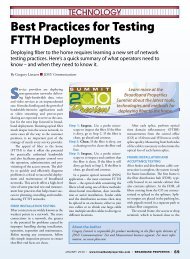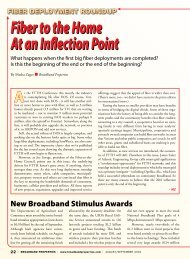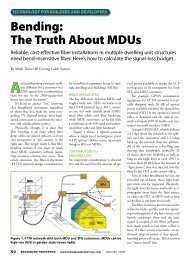2010 Buyers Guide - Broadband Properties
2010 Buyers Guide - Broadband Properties
2010 Buyers Guide - Broadband Properties
Create successful ePaper yourself
Turn your PDF publications into a flip-book with our unique Google optimized e-Paper software.
<strong>Broadband</strong> and the Economy:<br />
The Big Picture – In Short<br />
A roundup of recent findings about the relationship between broadband<br />
and economic conditions worldwide.<br />
<strong>Broadband</strong>’s Benefits Rise With Use<br />
Two new studies show that broadband’s<br />
economic effect isn’t a<br />
straight-line function. Rather,<br />
the more widespread and heavily used<br />
broadband is, the more important it becomes<br />
to the economy.<br />
Pantelis Koutroumpis, a Ph.D.<br />
student at the Imperial College Business<br />
School in London, compared the<br />
growth rates of European Union countries<br />
over the middle years of this decade.<br />
Koutroumpis won an award for his<br />
work at last year’s Biennial International<br />
Telecommunications Society Conference<br />
in Montreal.<br />
Koutroumpis tried to capture what he<br />
calls the “two-way relationship between<br />
growth and broadband infrastructure” –<br />
that is, to find out both how economic<br />
growth creates demand for broadband<br />
and how broadband infrastructure creates<br />
growth. He found, of course, that<br />
wealthier, better educated and more urbanized<br />
countries have more demand for<br />
broadband services. But independent of<br />
this, he found that adopting broadband<br />
boosted a country’s overall economic<br />
growth: Every 1 percent increase in the<br />
broadband penetration rate increases<br />
economic growth by an average of 0.038<br />
percent.<br />
Given that broadband penetration<br />
in Europe increased by 27.5 percent over<br />
the three-year period studied (therefore<br />
increasing growth by 1.05 percent) and<br />
the overall economy grew by about 12<br />
percent, broadband adoption accounted<br />
for close to 10 percent of Europe’s economic<br />
growth over the period.<br />
<strong>Broadband</strong>’s Critical Mass<br />
When he looked more closely at countries<br />
that have different levels of broadband<br />
penetration, Koutroumpis found<br />
that broadband adoption had the most<br />
impact in the countries that already<br />
had the highest broadband penetration.<br />
Once broadband penetration reached<br />
about 50 percent of households, a “critical<br />
mass” effect made broadband even<br />
more valuable. In high-broadband<br />
countries such as the Netherlands and<br />
the Scandinavian countries, broadband<br />
adoption boosted the economy by about<br />
1 percent per year; in countries with<br />
low broadband penetration, broadband<br />
adoption boosted the economy by only<br />
about half a percent per year.<br />
Koutroumpis says, “Put simply, once<br />
more than half the population has access<br />
to broadband, returns to the economy at<br />
least double, when compared to countries<br />
with lower broadband access. This<br />
has important implications for regulators<br />
and policymakers in the developed<br />
and developing world.”<br />
<strong>Broadband</strong> Needs<br />
an Ecosystem<br />
Another study to examine this relationship<br />
is “Economic Impact of <strong>Broadband</strong>:<br />
An Empirical Study,” published<br />
by economic consulting group LECG<br />
and commissioned by Nokia Siemens<br />
Networks (available at www.connec<br />
tivityscorecard.org/images/uploads/me<br />
dia/Report_<strong>Broadband</strong>Study_LECG_<br />
March6.pdf).<br />
Like Koutroumpis, the LECG authors<br />
found that broadband’s impact<br />
varies among countries. In their view,<br />
impact varies according to how well<br />
societies use their broadband capacity.<br />
Businesses more dependent on IT benefit<br />
more from their broadband connections.<br />
In countries using a lot of technology,<br />
every percentage point increase<br />
in broadband penetration increases productivity<br />
by about 0.1 percent. In the<br />
United States specifically, the growth in<br />
broadband penetration between 1999<br />
and 2007 appeared to account for about<br />
one-eighth of productivity growth over<br />
that period.<br />
Impact on GDP of Future Increases in <strong>Broadband</strong> Penetration<br />
In Countries With High Technology Use<br />
(Millions of 2000 US Dollars)<br />
Country<br />
1 Percentage<br />
Point Increase<br />
5 Percentage<br />
Point Increase<br />
10 Percentage<br />
Point Increase<br />
France 1,769 8,846 17,692<br />
Finland 157 783 1,567<br />
Germany 2,023 10,115 20,229<br />
Sweden 274 1,368 2,736<br />
UK 1,845 9,225 18,451<br />
US 11,528 57,640 115,280<br />
Source: LECG<br />
November/December 2009 | www.broadbandproperties.com | BROADBAND PROPERTIES | 67

















